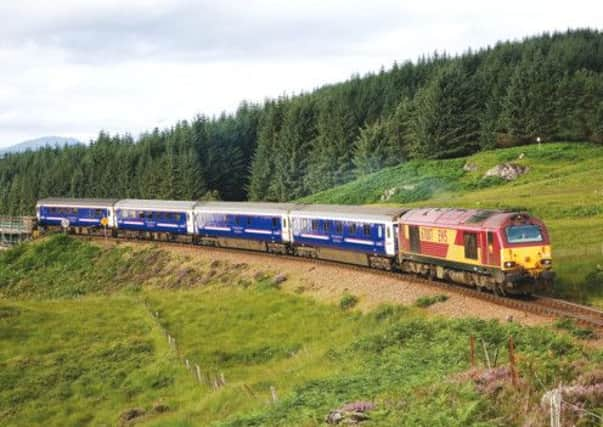Train driver doubts over Caledonian Sleeper plans


Rail firms are also understood to have concerns about whether the locomotives can cope with hilly Scottish routes.
They are also worried about the potential impact on other trains of another type of engine that will be used for the service, because these have a lower top speed than the locomotives which currently haul the sleepers.
Advertisement
Hide AdAdvertisement
Hide AdSerco will take over the London-Scotland overnight franchise in April with a pledge to create a service “emblematic of the best of Scotland”.
However, it has emerged that the plans include using rebuilt locomotives within Scotland that have never run before north of the Border, which train drivers’ union Aslef said had a poor reliability record.
A report commissioned by Scottish Government agency Transport Scotland, which is in charge of the £800m sleeper contract, has also warned of the risk of using such untested locomotives, known as class 73s.
The study, by consultants Atkins, raised further concern about other, class 92, engines which will haul the sleepers between Scotland and England because their low top speed could be insufficient to make up lost time after delays.
Aslef Scottish secretary Kevin Lindsay said he had “real concerns” about using the 1960s-vintage class 73s to run the trains between Edinburgh and Aberdeen, Inverness and Fort William.
He said: “We feel it’s not going to work. They were terrible when they came in and terrible over their whole career.”
The Atkins report stated: “The leading bidder has proposed the use of class 73 and class 92 locomotives, to replace the class 67 locomotives currently used to haul sleeper rolling stock.
“There is a risk associated with the introduction of refurbished traction not previously used for sleeper haulage.
Advertisement
Hide AdAdvertisement
Hide Ad“There are risks in terms of the suitability of this type of traction, which is, as yet, untested in the conditions that the Sleeper operates in. Rebuilt Class 73 locomotives are not already cleared for operation on all Sleeper routes.”
It is understood there are also concerns within the rail industry about how the engines will cope on hilly Highland routes.
The Atkins report also referred to the class 92 locomotives which Serco plans to use for the sleeper between London and Edinburgh and Glasgow.
It said: “There are further risks aligned to this, most obviously related to the ability of the Class 92 (87 mph) locos to recover from delay. It will remain an area that Transport Scotland and [track owner] Network Rail should monitor closely.”
The class 92s would replace locomotives with a top speed of 110mph.
Other train operators which use the busy west coast main line on which the sleepers run are understood to be concerned about potential delays to their trains because of the density of rail traffic into London in the morning rush hour.
Serco, which Scotland on Sunday revealed as the franchise winner in May, said the rebuilt locomotives would be more reliable than the ones they replace and use 40 per cent less fuel.
It said the locomotives would haul both the existing sleeper coaches and brand new carriages being phased in by 2018.
Advertisement
Hide AdAdvertisement
Hide AdSerco has hired Michelin-starred chef Albert Roux and luxury hotel Inverlochy Castle to help run the service, with the new coaches featuring ensuite cabins.
Managing director of transport David Stretch said: “We are completely rebuilding the entire fleet of class 73/9 locomotives to ensure they are safe and reliable.
“The rebuilt locos will have completely new diesel engines.”
He said both the class 73 and 92 locomotives were being modified to ensure they are “completely compatible” with the new sleeper coaches.
Stretch said the class 92s’ top speed was above the sleepers’ “normal 80mph maximum operating speed”.
He said: “On several occasions, class 92 locomotives have operated the Caledonian Sleeper and have shown no problems in maintaining the schedules and on occasion regaining time.”
A Transport Scotland spokeswoman said: “We are entirely confident these extensively-renewed locomotives, along with the brand new trains already announced, are appropriate to deliver the significantly enhanced Caledonian Sleeper service.”
“The vehicle structures and mechanical components have been totally stripped to remove any corrosion or other wear and tear and rebuilt to as-new condition.”